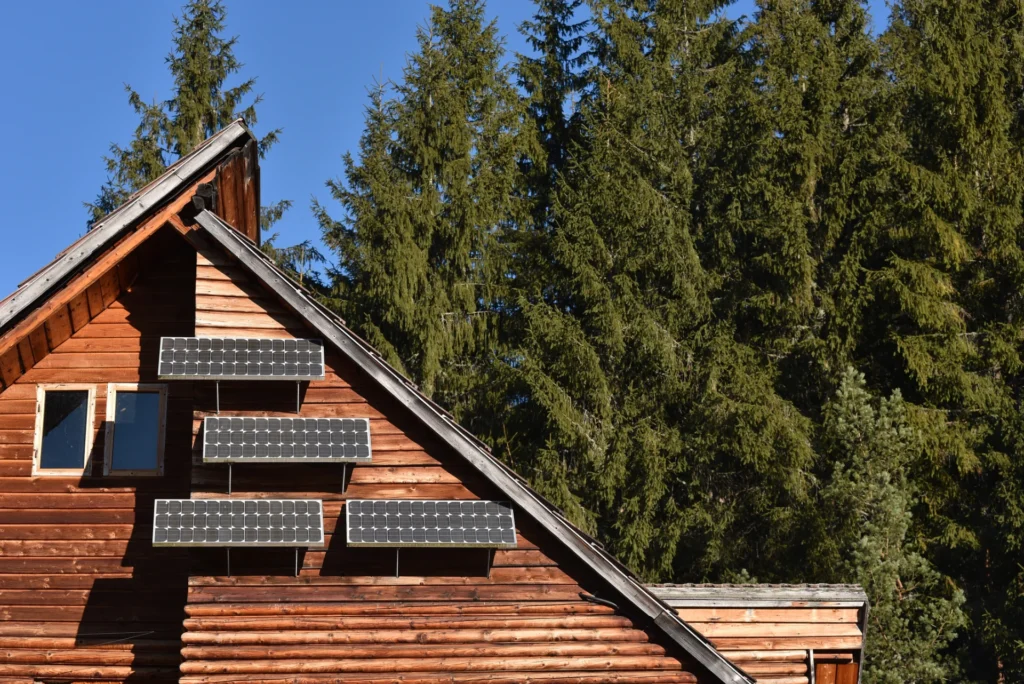
Solar power is becoming increasingly popular for individuals and businesses looking to reduce their carbon footprint and energy costs. However, with the many options available, it can be difficult to determine which type of solar system is right for your specific needs. Two main types of solar systems are On-Grid And Off-Grid Solar Systems ; understanding the differences between these two systems is essential when deciding which to choose.
On-grid solar systems are connected to the electrical grid and work in tandem with traditional electricity sources. They generate clean energy from the sun during daylight hours while still allowing a connection to the grid when additional power is needed or when there isn’t enough sunlight available. On the other hand, off-grid solar systems operate independently from any utility company’s electrical grid. These self-contained systems store excess energy in batteries to provide power even at night or on cloudy days without sunlight. In this article, we will explore both types of solar systems in detail and discuss how they differ in components, reliability, maintenance requirements, cost comparison, and more.
The adoption of solar power as a renewable energy source has increased in recent years due to technological advancements and decreasing costs. Solar panels convert sunlight into electricity and are widely used for residential and commercial purposes. Unlike fossil fuels that emit harmful greenhouse gases, solar power is clean and emits no pollutants during operation. Additionally, the sun is an abundant resource that can be harnessed anywhere in the world.
The advantages of solar power systems include their ability to reduce electricity bills significantly over time while providing a reliable energy source. Homeowners who install solar panels can also take advantage of state and federal tax credits, reducing the overall cost of installation. However, one major disadvantage of on-grid solar systems is their reliance on the electrical grid. During power outages or maintenance periods, these systems cannot operate without a backup generator or battery storage system.
On the other hand, off-grid solar systems offer more independence from traditional utility companies by storing excess energy produced during daylight hours in batteries for use at night or during cloudy days. These systems are common in remote areas where access to the electrical grid is limited or non-existent. Despite higher upfront costs than on-grid systems, off-grid systems have future potential as they provide homeowners with complete control over their energy usage and production.
In conclusion, while both on-grid and off-grid solar power systems have advantages and disadvantages depending on individual needs and circumstances, these sustainable technologies offer a promising future for clean energy production worldwide. The continued development of emerging technologies, such as advanced battery storage solutions, will make off-grid solutions even more viable for widespread adoption in years to come.
On-grid solar systems refer to solar power systems connected to the traditional power grid. These systems allow homeowners and businesses to sell excess energy to the grid, earning credits on their electricity bills. Additionally, on-grid solar systems provide access to grid power when needed, ensuring a reliable source of electricity even during periods of low sunlight or high energy demand. Overall, on-grid solar systems offer numerous benefits for those seeking to reduce their carbon footprint while maintaining access to reliable and cost-effective electricity.
Solar power systems that are connected to the traditional power grid have the advantage of being able to supplement their energy supply with electricity from the grid during times when solar energy production is insufficient. This means that on-grid solar systems are less dependent on weather conditions and can provide homeowners and businesses a more reliable energy source. Additionally, excess energy produced by the on-grid system can be sold back to the utility company for credit towards future bills, providing potential financial benefits.
However, there are also some drawbacks to using an on-grid solar system. One significant disadvantage is that these systems do not provide backup power in case of a blackout or other power outages. This means that homeowners or businesses will still be without electricity even if an on-grid solar system is installed. Furthermore, relying solely on the traditional power grid can lead to higher costs and exposure to fluctuations in electricity prices over time. Overall, it’s important for individuals considering an on-grid solar system to weigh both the pros and cons carefully before deciding based on their specific needs and priorities.
One advantage of solar power systems that are connected to the traditional power grid is the ability to sell surplus power back to the utility company. This process, called net metering, involves installing a special meter that measures the energy consumed from the grid and the excess energy generated by the solar panels. The excess energy flows back into the grid, and homeowners receive credits on their electricity bills for every kilowatt-hour (kWh) surplus power produced.
Net metering allows homeowners with on-grid solar systems to maximize their savings and reduce reliance on traditional fossil fuel-based electricity. It also incentivizes homeowners to invest in larger solar installations as they can generate more excess energy and earn more credit towards their future bills. Moreover, selling surplus power ultimately benefits society by reducing peak demand on utilities during periods of high electrical usage, leading to lower overall costs for everyone involved in producing and delivering electricity.
Access to reliable and consistent grid power is crucial in ensuring the widespread adoption of renewable energy sources. On-grid solar systems have the advantage of being connected to the traditional power grid, providing users with access to a reliable source of electricity when needed. This means that on-grid solar system users can draw power from the grid when their solar panels are not producing enough energy, such as during periods of low sunlight or at night.
In emergencies, having access to grid power can be particularly important. For example, during natural disasters or other crises, an on-grid solar system can provide backup electricity in case of blackouts or power outages. Additionally, on-grid solar systems allow excess energy generated by the panels to be fed back into the grid and sold back to utility companies, further incentivizing their use and making them more economically viable. Overall, while off-grid solar systems may offer greater independence from traditional power grids, they lack the reliability and convenience provided by on-grid systems that remain connected to established infrastructure networks.
Off-grid solar systems are not connected to the traditional power grid and operate independently. These systems rely solely on solar energy, which is collected through photovoltaic panels and stored in batteries for later use. Off-grid solar systems are an eco-friendly option providing power to remote areas where access to a traditional power grid is difficult or impossible.
Solar systems not connected to traditional power grids can offer individuals and communities a sense of independence and self-sufficiency while contributing to a more sustainable future. Off-grid solar systems function as stand-alone units that generate electricity through solar panels, which store energy in batteries for later use. These systems are commonly used in rural areas, or locations where connecting to the main power grid is difficult or expensive.
One advantage of off-grid solar systems is their ability to provide reliable electricity in remote areas without access to traditional power sources. They also allow individuals and communities to be self-reliant, reducing their dependence on centralized energy providers. However, one disadvantage is that these systems require careful sizing based on the amount of energy required by the user, which can be difficult for those who lack technical expertise. Additionally, off-grid solar systems require regular maintenance and replacement of batteries over time, adding additional costs to the initial investment. Despite these challenges, off-grid solar systems remain attractive for those seeking greater autonomy and control over their energy needs.
The reliance on solar energy in an off-grid solar system is a notable feature that offers advantages and disadvantages. One advantage of relying solely on solar energy is that it is a renewable and sustainable power source. Unlike finite fossil fuels, the sun’s energy is expected to last billions of years. Additionally, off-grid systems do not contribute to greenhouse gas emissions, making them environmentally friendly.
However, there are also some disadvantages to relying solely on solar energy:
In contrast to on-grid solar systems, off-grid solar systems rely solely on solar energy for power. This means that they are not connected to the electrical grid and can operate in areas without access to electricity. However, relying solely on solar energy may have limitations and require additional storage capacity or backup generators.
One major advantage of off-grid solar systems is their eco-friendliness and contribution towards sustainability initiatives. These systems do not emit greenhouse gases or pollutants associated with traditional electricity sources such as coal or natural gas. Additionally, they promote the use of renewable energy and encourage individuals to adopt more environmentally conscious practices. As we strive towards a greener future, incorporating eco-friendly practices such as implementing off-grid solar systems can significantly reduce our carbon footprint and preserve the environment for future generations.
Pros | Cons |
|
|
Promotes sustainability | Requires additional storage capacity |
Reduces carbon footprint | May need backup generator |
Environmentally friendly | Initial installation costs may be high |
Can operate in remote locations | Limited power output capacity |
| Requires regular maintenance and upkeep |
The components required for a solar system connected to the electric grid include inverters, photovoltaic arrays, and monitoring software. Inverters are essential in converting the direct current (DC) electricity produced by solar panels into alternating current (AC) electricity used in homes and businesses. The photovoltaic arrays consist of multiple solar panels that capture sunlight and convert it into DC electricity. Finally, monitoring software is used to track energy production and consumption.
During the installation process of an on-grid system, a qualified technician will connect the inverter to the electrical panel of the house or building. The photovoltaic arrays are then mounted on rooftops or other suitable locations for maximum sunlight exposure. Once installed, an on-grid system has minimal maintenance requirements as they rely on utility companies to provide backup power when needed.
One advantage of using an on-grid system is that excess energy generated during peak hours can be sold back to utility companies through net metering programs. This allows homeowners or businesses with solar systems to receive credits toward their future bills, reducing overall costs. Additionally, since these systems are connected to the grid, they can still function during periods of low sunlight or at night when battery storage may be insufficient.
In conclusion, understanding the components required for an on-grid solar system is crucial in making informed decisions about today’s renewable energy options. While maintenance requirements for these systems may be minimal after installation, it’s important to consider factors such as net metering programs and how they can impact long-term savings. Ultimately, incorporating renewable energy sources like solar power can help individuals achieve greater independence while contributing towards a more sustainable future for all.
Off-grid solar systems are designed to operate independently from the utility grid and require three main components: solar panels, battery storage, and a backup generator. Solar panels are essential for converting sunlight into electricity, stored in batteries for later use. Battery storage allows energy to be consumed when no sunlight is available, while a backup generator provides additional power. These components work together to create a reliable and sustainable source of electricity for off-grid homes and businesses.
Solar panels are a sustainable and eco-friendly energy source that has the potential to transform our world. They work by converting sunlight into electricity, which can be used to power homes, businesses, and other buildings. The installation process for solar panels involves several steps, including site analysis, system design, and panel mounting. Cost analysis is also an important aspect of installing solar panels, as the initial investment may seem high but can result in long-term savings on energy bills.
Regarding off-grid solar systems specifically, some key considerations regarding using solar panels exist. Firstly, it is important to ensure that enough solar panels are installed to meet the energy needs of the home or building. This requires careful calculation based on factors such as location and weather patterns. Additionally, off-grid systems often rely on battery storage to ensure energy is available even when sunlight is absent. As a result, it is important to choose high-quality panels with efficient conversion rates to maximize energy production and minimize reliance on batteries overall. At the same time, there are certainly challenges associated with installing off-grid solar systems using solar panels as the primary power source offers numerous benefits for those seeking greater independence from traditional energy sources.
Solar panels generate electricity when exposed to sunlight, but this energy source is intermittent, as it relies on solar radiation. This is where battery storage comes in. Battery storage systems can store excess electricity generated by solar panels during the day and discharge it back into the grid or power a home during low solar output. The use of battery storage is essential for off-grid solar systems which do not have access to a consistent electrical grid.
Battery storage offers several advantages for both on-grid and off-grid solar systems. For on-grid systems, batteries can provide backup power during blackouts or periods of high demand when the grid cannot keep up with the electricity demands of consumers. Additionally, storing excess energy in batteries saves homeowners money by avoiding peak-hour pricing from their utility companies. However, there are limitations to battery storage technology, including cost, maintenance requirements, and limited lifespan. Nonetheless, technological advancements are making batteries more affordable and efficient than ever, making them an increasingly attractive option for those looking to invest in renewable energy solutions.
Installing a backup generator is a viable solution to ensure an uninterrupted power supply during emergencies or high electricity demand. Backup generators are commonly used in off-grid solar systems as they provide an alternative source of energy when the primary system fails. In on-grid solar systems, backup generators can reduce peak demand charges by generating electricity during high energy usage.
One advantage of a backup generator is that it can run on various fuel types, such as diesel, propane, and natural gas. Diesel generators are known for their reliability and efficiency but require regular maintenance and produce noise pollution. Propane generators emit less harmful emissions than diesel generators, but they have shorter runtimes due to limited fuel storage capacity. Natural gas generators are considered the cleanest option as they emit fewer pollutants than diesel or propane generators, but their availability may be limited in some areas. Despite these advantages, backup generators also present disadvantages, such as higher upfront installation and fuel storage costs and potential environmental harm through emissions production.
Maintenance requirements vary depending on the type of solar system used. For off-grid systems, maintenance is crucial to ensure uninterrupted power supply. Common issues that may arise include battery degradation and malfunctioning charge controllers or inverters. Necessary skills for maintaining an off-grid system include knowledge of electrical systems, troubleshooting techniques, and familiarity with the specific equipment used in the system.
Preventative measures are also important to avoid major issues with an off-grid solar system. Regular inspections should be conducted to check for any signs of wear and tear or damage to equipment. Batteries must be regularly checked for proper charging levels and cleaned to prevent corrosion. Emergency repairs may also need to be performed in case of sudden breakdowns or malfunctions.
In contrast, on-grid solar systems require less maintenance than off-grid systems as they are connected directly to the utility grid. Maintenance typically involves checking the solar panels for dirt and debris buildup that can lower their efficiency over time. Additionally, ensuring proper wiring connections between the solar panels and grid-tie inverters is necessary.
Overall, keeping a well-maintained solar system ensures its longevity and maximum energy production capabilities while minimizing unexpected breakdowns or failures. As such, it is essential for homeowners considering a switch to renewable energy sources like solar power to understand these maintenance requirements before making a decision.
Maintenance requirements are one of the crucial aspects to consider when choosing between On-Grid And Off-Grid Solar Systems. However, another essential factor is reliability. The importance of reliability cannot be overstated regarding solar energy systems. This aspect determines the system’s performance over time, regardless of external conditions such as weather patterns.
The reliability of an on-grid solar system is quite high due to its connection to the electrical grid. If there is a power outage or any other issue with the system, the main electricity grid can serve as backup support. Moreover, since on-grid systems do not require battery storage units that need regular maintenance and replacement, they offer better long-term performance than off-grid systems.
On the other hand, off-grid solar systems rely entirely on their internal components for operation without any connection to the electrical grid. Therefore, its overall performance depends heavily on various factors, such as battery lifespan and weather patterns in the area where it’s installed. The impact of weather patterns like heavy rains or snowfall can cause damage to panels or reduce their efficiency over time.
An on-grid solar system may be more reliable in areas prone to harsh weather conditions since it provides backup support during outages while offering a continuous power supply. However, those living in remote areas without access to electricity grids or those looking for complete independence from utility companies’ services may find off-grid solar systems more suitable despite their higher maintenance requirements for optimal performance.
Both on-grid and off-grid solar systems have their advantages and disadvantages regarding reliability. While an on-grid solar system offers more reliable and consistent service due to its connection to the main electrical grid network and absence of battery storage units that require frequent replacements, off-Grid Solar Systems provide greater flexibility by allowing homeowners complete control over their energy use while providing uninterrupted service even during power outages if adequately maintained despite being dependent solely upon internal components susceptible to degradation from weather impacts. Ultimately, the choice between these systems comes down to individual needs and preferences.
When considering the feasibility of solar energy, one must consider the initial installation costs as well as the long-term expenses that come with maintenance and upkeep. Initial costs can vary depending on whether it is an on-grid or off-grid system, while long-term costs can be influenced by factors such as equipment quality and efficiency. A cost comparison between on-grid and off-grid systems should be analyzed to determine which option is more financially viable in the long run.
The upfront investment required for establishing an off-grid solar energy system can be substantial, however, the long-term cost savings and environmental benefits may outweigh the initial expenses. An ROI analysis can help determine whether or not investing in an off-grid solar system is a financially viable option. This analysis considers factors such as the cost of electricity from the grid, the expected lifespan of the solar panels, and any financing options available.
Financing options for off-grid systems include loans, grants, and incentives from government programs. These financing options can make it easier for individuals or businesses to afford the initial costs of setting up an off-grid solar system. Moreover, since these systems are not connected to the main power grid, they do not incur monthly electricity bills, which results in significant savings over time. Therefore, while high initial costs may be associated with going off-grid with solar energy, financing options, and potential long-term cost savings make it a worthwhile investment for those seeking independence from traditional utility companies.
Several factors, such as the lifespan of the solar panels, maintenance requirements, and replacement costs, influence the long-term costs of an off-grid solar energy system. Off-grid systems typically require larger upfront investments than on-grid systems since they must meet all energy demands without grid backup. However, these systems can save homeowners money on their electricity bills in the long run by reducing or eliminating their reliance on utility companies.
Comparing upfront and long-term costs is critical when considering financing options for long-term savings. Financing options like leasing or purchasing a solar system with a loan can help offset some of the initial costs of an off-grid solar system while reaping the benefits of lower electricity bills over time. However, it’s essential to consider that financing options come with additional fees and interest rates that may increase overall total expenses in the long run compared to paying for a system outright. Ultimately, the pros and cons of each financing option should be weighed against each other before deciding which option will work best for individual needs and budget constraints.
Selecting the appropriate solar system requires a thorough understanding its operational requirements and technical specifications. One of the primary considerations when choosing between on-grid and off-grid solar systems is the installation process. On-grid systems are typically easier to install as they do not require complex battery storage solutions or backup generators. In contrast, off-grid systems require additional components such as batteries, charge controllers, and inverters to store excess energy for later use.
Maintenance is another important factor to consider when deciding between on-grid and off-grid solar systems. While both types of systems require periodic cleaning and inspection, on-grid systems tend to be more low-maintenance due to their reliance on the electrical grid for power stability. On the other hand, off-grid systems require regular upkeep of battery storage units and charge controllers to maintain optimal performance.
Choosing the right solar system for your needs depends on various factors, including location, energy usage habits, budget constraints, and personal preferences. Those seeking greater independence from traditional utility companies or living in remote areas with limited access to reliable power grids may opt for an off-grid solution despite their higher upfront costs and maintenance requirements. However, those who prioritize convenience over self-sufficiency or live in urban environments may find that an on-grid system better suits their needs.
In summary, selecting the appropriate solar system requires careful consideration of several factors, including installation processes and maintenance tips. Both systems have unique advantages and disadvantages that must be weighed against individual preferences before deciding. Ultimately, choosing between an on-grid or off-grid solution will depend largely on one’s specific energy usage habits, cost limitations, and long-term goals regarding sustainability, independence,and environmental impact.
Solar power has become increasingly popular as a sustainable and cost-effective energy source. On-grid and off-grid solar systems are two main types of solar systems that differ in their components, maintenance requirements, reliability, and cost. On-grid systems are connected to the public utility grid, while off-grid systems operate independently from the grid.
On-grid solar systems are more common in urban areas where access to the grid is readily available. These systems rely on the grid for backup power when sunlight is unavailable, ensuring a stable electricity supply throughout the day. On the other hand, off-grid solar systems are advantageous in remote locations where connection to the grid may be difficult or impossible. They rely entirely on batteries to store excess energy generated during sunny periods for use when there is no sunlight.
On-grid and off-grid solar systems have different components, such as inverters, charge controllers, and batteries, making them function efficiently. However, maintenance requirements for these two types of solar systems differ significantly based on their design and complexity. While the on-grid solar system requires less maintenance due to reliance on a stable public utility grid system, off-grids require frequent checkups since they operate independently, meaning any issues can only be detected by regular checks.
Choosing between an on-grid or an off-grid solar system depends primarily on location, power needs, and budget constraints. While both options provide benefits such as reduced carbon footprint and significant cost savings compared with traditional energy sources, deciding what type of system best suits your needs requires careful consideration of various factors, including installation fees and ongoing expenses like battery replacements/maintenance costs.
In conclusion, whether you choose an on-grid or off-grid system will depend largely upon your circumstances, but understanding how each works can help you decide which option would suit your household’s needs best. As renewable energy continues gaining momentum globally, adopting either technology promises long-term benefits that could lead to a more sustainable future for everyone.
During a power outage, an on-grid solar system alone cannot function as it relies on the utility grid for power transmission. However, with power backup solutions such as battery storage, it is possible to maintain the electricity supply during blackouts. Battery storage allows excess solar energy generated during the day to be stored for later use when no sunlight is available. This gives homeowners greater energy independence and flexibility in managing their energy consumption. While the initial investment cost for battery systems may be high, they offer long-term cost savings and contribute towards a more sustainable future by reducing dependence on fossil fuels and grid-tied electricity.
Lifespan estimation of solar panels in an off-grid system requires a thorough understanding of the panel’s design, construction materials, and environmental conditions. Generally, solar panels in off-grid systems have a lifespan ranging from 25 to 30 years with proper maintenance requirements. Maintenance includes regular cleaning to remove dirt and debris that can reduce energy output, checking for any physical damage or cracks on the surface, and replacing faulty components such as inverters or charge controllers. The lifespan estimation can also be affected by factors such as temperature fluctuations, humidity levels, UV radiation exposure, and extreme weather conditions. Therefore, it is advisable to consult with a professional installer who can guide how to optimize the performance of your off-grid solar system and extend its lifespan through proper maintenance practices.
Energy storage options for on-grid solar systems are becoming increasingly popular as homeowners look to gain more control over their energy usage. There are several energy storage options available, including batteries and grid-tied inverters. Batteries can store excess energy produced during the day, which can be used at night when demand is higher. Grid-tied inverters allow homeowners to sell their excess energy back to the utility company in exchange for credits, reducing overall electricity costs. While these options can add significant upfront costs to an on-grid solar system, they may ultimately pay off in the long run by reducing reliance on the grid and providing greater energy independence. A cost comparison should be conducted before deciding which option suits a specific homeowner’s needs.
Switching from an on-grid to an off-grid solar system is feasible, but it requires careful consideration of the costs and benefits. Off-grid systems are typically more expensive than on-grid systems due to the need for battery storage and backup generators. However, they offer greater independence and self-sufficiency, which appeals to those seeking freedom from reliance on traditional power sources. Additionally, switching may be more practical for those living in remote areas where connection to the grid is difficult or costly. Ultimately, the decision to switch depends on individual circumstances and priorities, with cost comparison being a key factor in the analysis.
When considering the environmental benefits of solar energy, it is important to distinguish between on-grid and off-grid systems. On-grid systems are connected to a larger power grid and feed excess energy back into the grid for others to use, whereas off-grid systems rely solely on their storage capacity. Off-grid systems may seem more sustainable since they do not rely on fossil fuels or contribute to centralized power grids but also require high upfront costs for equipment and maintenance. On the other hand, on-grid systems offer economic viability through net metering programs that compensate homeowners for excess energy production. Ultimately, both options have their advantages and disadvantages when it comes to sustainability and cost-effectiveness. Analyzing individual needs and circumstances is crucial before deciding which system is best suited for a particular situation.

How Long To Install A Residential Solar Panel System? Share: Facebook Twitter LinkedIn Pinterest Installing a residential solar panel system is a significant investment that
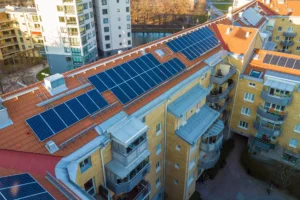
Can I Install Solar Panels On A Rental Property? Share: Facebook Twitter LinkedIn Pinterest As more individuals and businesses seek to reduce their carbon footprint,
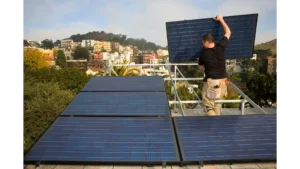
Best Mounting Options for Solar Panels: A Comprehensive Guide Share: Facebook Twitter LinkedIn Pinterest Solar energy is a renewable and sustainable source of power that

Will I Need To Get A New Roof Before Installing Solar Panels? Share: Facebook Twitter LinkedIn Pinterest As homeowners and businesses strive to reduce their
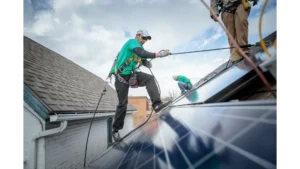
How To Find A Good Solar Panel Installer? Share: Facebook Twitter LinkedIn Pinterest Good Solar Panel Installer Solar panels have become popular for homeowners looking
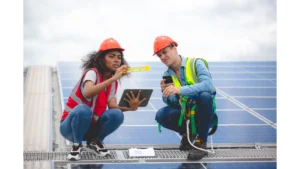
How Much Space Do I Need On My Roof To Install Solar Panels? Share: Facebook Twitter LinkedIn Pinterest Do I have enough Space on My